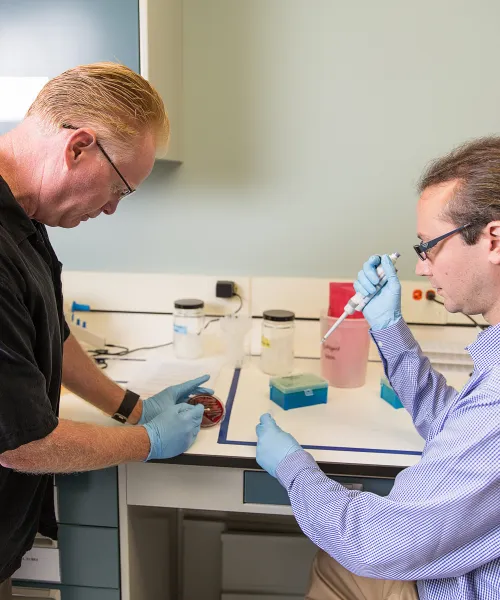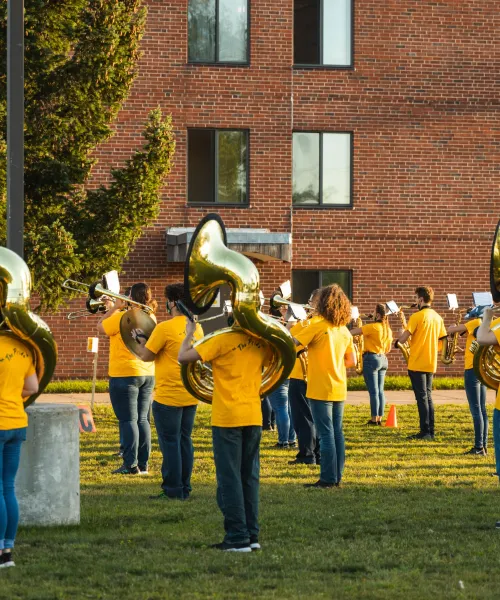Donor scholarships enable students to conduct COVID-19 campus-wide testing and analysis
The value of scholarships can extend beyond student recipients to the campus and surrounding community. This was demonstrated over the summer as NMU planned ahead for mass testing of students, faculty and staff for the COVID-19 virus before a return to face-to-face instruction this fall. Through the generous support of donors and a timely, multidisciplinary response from faculty, students gained classroom knowledge and clinical experience in addressing COVID-19. They helped to provide the human resource capability required by the NMU Health Center to independently test more than 7,000 individuals over a few weeks in the Passport to Campus program. All of these efforts enabled the university to open in a safe and responsible manner.
NMU faculty developed a six-week, online summer course that covered the SARS-COV-2 biology and COVID-19 pathology; the pandemic and epidemiology; various testing procedures; and contact tracing. Four academic disciplines offered it as a special topics course: clinical sciences, nursing, biology, and health and human performance.
It was unclear at first if students would enroll because of the additional expense they would incur. To remove the financial barrier, private funds were secured by the NMU Foundation to cover the costs. The Holly and Rod Aldrich COVID-19 Virology and Testing Class Scholarship was created to cover tuition for 12 students.
An additional eight scholarships were provided from the gifts given by annual donors to the Nursing Department Fund.
“The students put what they learned into practice by dedicating clinical hours to assist with nasal swab collections during the testing event and conducting laboratory-based research to develop COVID-19 tests under approved protocols,” said Paul Mann, associate dean and director of the School of Clinical Sciences. “Some have continued to assist with biweekly collections for surveillance monitoring.”

Kristi Robinia, associate dean and director of the School of Nursing, worked with nursing professor Sarah Jennings ’18 MPA to quickly educate a 50+ student volunteer force. They taught them how to safely put on and take off personal protection equipment, obtain and handle specimens correctly and execute essential infection control measures between tests.
“Having a core group of trained and interested volunteers from the COVID class was a key component to being able to organize this endeavor,” said Robinia.
“When I talked to students who took the course, their comments indicated its impact. One was, ‘I didn’t realize how genetics impacts the viral testing; the course opened my eyes to the importance of obtaining accurate samples for testing.’ Another was, ‘I’m entering my population health course with a much larger understanding of the impact of pandemics and the importance of interdisciplinary approaches to such problems.’”
Mann said Northern’s clinical sciences programs are unique in that the curriculum ladders from a certificate program in medical laboratory assisting, to an associate degree in clinical laboratory technology, to a bachelor’s degree in clinical laboratory science.
“NMU is the only university to hold accreditation from the National Accrediting Agency for Clinical Laboratory Sciences for four different academic programs that are CLS concentrations,” Mann added. “These include medical laboratory technician, medical laboratory science, cytogenetics and diagnostic molecular science. Students in these programs train in affiliated clinical laboratories throughout the region and many affiliates offer students positions even before they graduate.”
Graduates of Northern’s clinical sciences programs consistently have a higher pass rate on the American Society of Clinical Pathology national certification exams and have a job placement or further education rate of more than 95%.
The BSN program is accredited by the Commission on Collegiate Nursing Education and is proud to be in its 51st year of existence. Strengths include the clinical experiences provided and the success rate of graduates taking the NCLEX exam.
Robinia reported that BSN students have participated in other initiatives: screening high school athletes for temperatures and COVID symptoms before sport practices; providing infection control activities for homeless clients at the Room at the Inn; coordinating a blood drive at NMU, which resulted in a record of blood collected on a single day; providing social support outreach to the elderly; and assisting with multiple flu vaccine clinics. All of these activities have helped to mitigate risk and enhance safety for the campus and surrounding communities.

NMU’s Pride of the North Marching Band entertained students in quarantine in Spalding Hall earlier this fall.
